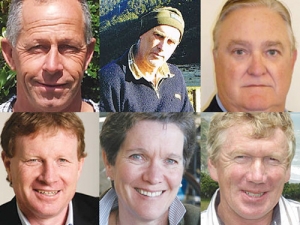Green Light for Fonterra's $3.2b Capital Return Scheme
Fonterra farmer shareholders have approved the mechanism for a $2/share capital return expected from the sale of its global consumer and associated businesses.
 (From top-left) Greg Maughan, Murray Beach, Ashley Waugh. (From bottom-left) John Wilson, Nicola Shadbolt, Blue Read.
(From top-left) Greg Maughan, Murray Beach, Ashley Waugh. (From bottom-left) John Wilson, Nicola Shadbolt, Blue Read.
Six candidates are standing for Fonterra board elections this year.
Three sitting directors – chairman John Wilson, Blue Read and Nicola Shadbolt – are seeking re-election. Also gunning for a seat are Murray Beach, Ashley Waugh and Greg Maughan. Here are the six candidate profiles:
Greg Maughan, Marton
Maughan served on the Fonterra shareholders council between 2004-08; he has served as chair and national judge for the New Zealand Dairy Awards. This month he unsuccessfully contested the DairyNZ board elections.
In his DairyNZ campaign Maughan said he has wide understanding of the industry from farm to governance level.
Murray Beach, Marlborough
Murray Beach shot to prominence last year after unsuccessfully moving a resolution calling for Fonterra to stop spending until the payout improves. Beach is unhappy with the current share structure and will propose a new share structure at this year's annual meeting.
He believes all Fonterra shareholders should be paid the same for milk.
Ashley Waugh, Waikato
A former chief executive of Australian dairy processor National Foods, Waugh has a dairy farm in Waikato.
During his time at National Foods he put together a deal that resulted in the big Asia/Oceania food and beverage company Kirin Holdings buying National Foods in 2007. Kirin Holdings merged National Foods in 2009, at which time Waugh left the company.
John Wilson, Te Awamutu
John Wilson joined the Fonterra board in 2003 as a farmer-elected director and became chairman in 2012. He chairs the people, culture and safety committee.
He was the inaugural chairman of Fonterra shareholders council. He is director of Turners & Growers Ltd and is a chartered member of the Institute of Directors in New Zealand.
Wilson lives on his dairy farm near Te Awamutu and jointly owns a dairy farming business near Geraldine, South Canterbury.
Nicola Shadbolt, Manawatu
Nicola Shadbolt was elected to the Fonterra board in 2009 and serves on the audit and finance committee.
She is a professor of farm and agribusiness management at Massey University.
She and her husband live in the Pohangina Valley, Manawatu, the base for the five farming and forestry equity partnerships they run, which include two dairy farms.
Blue Read, Taranaki
Blue Read was elected to the board in 2012. He sits on the cooperative relations committee and he led a water policy project team reporting to the this committee.
Read served as chairman of the Fonterra shareholders council from 2007 to 2010, having been a councillor since 2001 and deputy chairman from 2003 to 2007.
He has interests in two dairy equity partnerships in lower Waikato, and he lives and farms near Urenui, northern Taranaki.
Pāmu has welcomed ten new apprentices into its 2026 intake, marking the second year of a scheme designed to equip the next generation of farmers with the skills, knowledge, and experience needed for a thriving career in agriculture.
One team with 43 head, including a contingent from Mid Canterbury, are reflecting on a stellar NZ DairyEvent.
Fonterra farmer shareholders have approved the mechanism for a $2/share capital return expected from the sale of its global consumer and associated businesses.
Trainees in the horticulture industry studying towards a certificate or diploma can now apply for Horticulture New Zealand's (HortNZ) 2026 Industry Training Scholarships programme.
OPINION: The first three Global Dairy Trade (GDT) auctions have been a morale booster for farmers.
Former Fonterra executive Alex Turnbull has been appointed CEO to lead all five Yili Oceania Business Division companies in New Zealand.
OPINION: Staying with politics, with less than nine months to go before the general elections, there’s confusion in the Labour…
OPINION: Winston Peters' tirade against the free trade deal stitched with India may not be all political posturing by the…